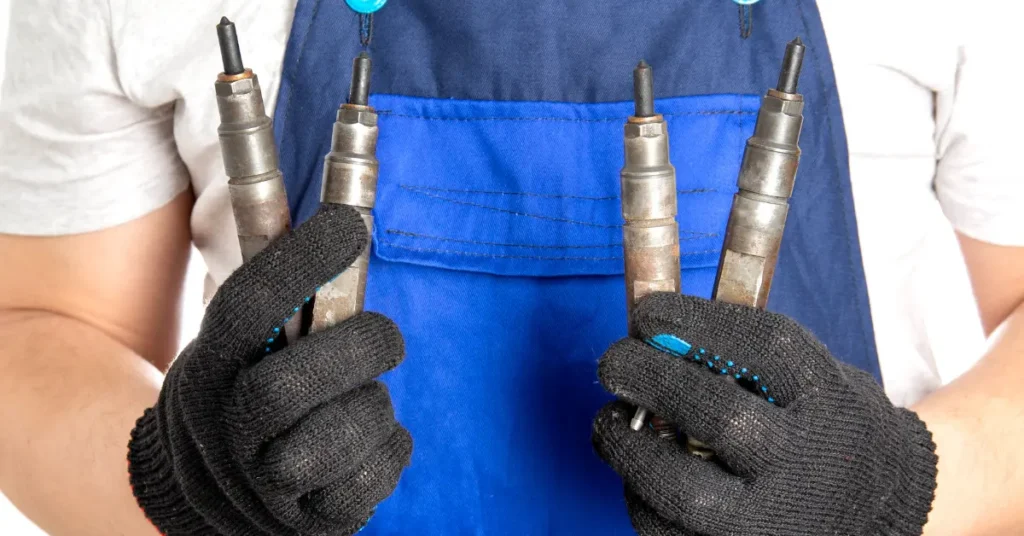
The P0420 Chevy code is a common diagnostic trouble code (DTC) that is associated with issues in the catalytic converter of a Chevrolet vehicle.
This code specifically indicates a problem with the efficiency of the catalytic converter, which is an essential component of the exhaust system.
In this article, we will explore the causes, symptoms, and potential solutions for the P0420 code in a Chevy vehicle.
Contents
Understanding the Catalytic Converter
Before we delve into the P0420 code and its implications, let’s first understand the role of the catalytic converter. The catalytic converter is responsible for reducing the harmful emissions produced by the engine.
It contains precious metals, such as platinum, palladium, and rhodium, which facilitate chemical reactions that convert toxic gases into less harmful substances.
The catalytic converter works by passing the exhaust gases through a honeycomb-like structure coated with the precious metals.
As the gases come into contact with the catalyst, chemical reactions occur, breaking down harmful pollutants into less harmful substances like carbon dioxide, water vapor, and nitrogen.
Causes of the P0420 Chevy Code
There are several potential causes for the P0420 code to appear in a Chevy vehicle. These causes may include:
Faulty Catalytic Converter
One of the primary reasons for the P0420 code is a malfunctioning catalytic converter. Over time, the internal components of the converter may degrade, leading to reduced efficiency and triggering the code.
A faulty catalytic converter can result from various factors, such as age, damage from road debris, or exposure to high temperatures.
When the converter fails, it cannot effectively convert the harmful gases, leading to increased emissions and triggering the P0420 code.
Oxygen Sensor Issues
A faulty oxygen sensor, particularly the sensor located downstream of the catalytic converter, can also result in the P0420 code. The oxygen sensor provides important data to the engine control unit (ECU) to regulate the air-fuel mixture.
If the sensor fails or provides inaccurate readings, it can affect the catalytic converter’s performance.
The oxygen sensor measures the amount of oxygen in the exhaust gases and sends this information to the ECU.
Based on the oxygen levels, the ECU adjusts the air-fuel mixture to ensure optimal combustion. If the downstream oxygen sensor fails, it may not accurately detect the efficiency of the catalytic converter, leading to the P0420 code.
Exhaust System Leaks

Leaks in the exhaust system, such as damaged or loose pipes, can cause the P0420 code to appear. These leaks can result in an imbalance in the air-fuel mixture, affecting the catalytic converter’s efficiency.
Exhaust system leaks can occur due to corrosion, physical damage, or improper installation. When there is a leak, unfiltered air enters the exhaust system, disrupting the proper functioning of the catalytic converter.
This can cause the catalytic converter to overwork and trigger the P0420 code.
Engine Misfire

A misfiring engine can produce excess unburned fuel, leading to an increase in emissions. This can put additional strain on the catalytic converter and trigger the P0420 code.
Engine misfires can occur due to various reasons, such as faulty spark plugs, ignition coils, or fuel injectors. When the engine misfires, it fails to combust the fuel-air mixture properly, resulting in unburned fuel reaching the catalytic converter.
This can lead to overheating and reduced efficiency, triggering the P0420 code.
Fuel System Issues
Problems in the fuel system, such as clogged fuel injectors or a failing fuel pressure regulator, can contribute to the P0420 code by causing inefficient combustion.
A clogged fuel injector can disrupt the proper atomization of fuel, leading to incomplete combustion.
This can result in increased emissions and reduced catalytic converter efficiency, triggering the P0420 code. Similarly, a failing fuel pressure regulator can cause an imbalance in the fuel delivery, affecting combustion and the converter’s performance.
Symptoms of the P0420 Code
When the P0420 code is present in a Chevy vehicle, the driver may experience the following symptoms:
Check Engine Light
The most obvious symptom of the P0420 code is the illumination of the check engine light on the dashboard. This light indicates that the vehicle’s onboard diagnostic system has detected a problem.
Reduced Engine Performance
In some cases, the vehicle may exhibit reduced engine power or decreased acceleration. This can occur due to the engine control unit’s attempt to compensate for the catalytic converter’s inefficiency.
Increased Fuel Consumption
A faulty catalytic converter can negatively impact fuel efficiency, leading to increased fuel consumption.
Emission Test Failure
If the P0420 code is not addressed, it can cause the vehicle to fail emission tests. This can create legal complications and prevent the vehicle from being legally driven on the road.
Diagnosing and Resolving the P0420 Code
To diagnose and resolve the P0420 code in a Chevy vehicle, it is recommended to follow these steps:
Scan for Additional Codes
Before addressing the P0420 code, it is crucial to scan for any additional codes that may indicate underlying issues. These codes can provide insights into other potential problems that need attention.
Inspect the Catalytic Converter
Visually inspect the catalytic converter for any signs of physical damage, such as cracks or dents. If any issues are identified, the catalytic converter may need to be replaced.
Check Oxygen Sensor Readings
Use a diagnostic tool to monitor the oxygen sensor readings, paying particular attention to the downstream sensor. If the readings are unstable or do not match the expected values, replacing the oxygen sensor may be necessary.
Inspect the Exhaust System
Thoroughly examine the exhaust system for any leaks or loose connections. Repair or replace any damaged components to ensure a proper seal.
Address Engine Misfires
If the P0420 code is accompanied by engine misfire codes, it is important to diagnose and address the misfires. This may involve inspecting spark plugs, ignition coils, and fuel injectors for any issues.
Clean or Replace Fuel Injectors

In some cases, clogged fuel injectors can contribute to the P0420 code. Consider cleaning or replacing the fuel injectors to restore proper fuel atomization.
Resetting the Code
After addressing the potential causes, reset the onboard diagnostic system by disconnecting the battery for a few minutes. This will clear the stored trouble codes.
Monitor for Recurrence
After resetting the code, drive the vehicle and monitor its performance. If the check engine light does not reappear and there are no related symptoms, the issue may have been successfully resolved.
It is essential to note that addressing the P0420 code may require professional expertise and advanced diagnostic tools. Consulting with a qualified mechanic or automotive technician is recommended to ensure accurate diagnosis and proper resolution.
Conclusion
In summary, the P0420 code in a Chevy vehicle indicates a problem with the catalytic converter’s efficiency.
Several potential causes, such as a faulty catalytic converter, oxygen sensor issues, exhaust system leaks, engine misfires, or fuel system problems, can trigger this code.
Recognizing the parallels in these scenarios enhances your ability to troubleshoot and address the root cause effectively.
Recognizing the symptoms and following the recommended diagnostic and resolution steps can help resolve the issue and avoid further complications.
FAQ
1. What is the P0420 code in a Chevy vehicle?
The P0420 code is a diagnostic trouble code that indicates a problem with the efficiency of the catalytic converter in a Chevy vehicle.
2. What are the common causes of the P0420 code?
The common causes of the P0420 code in a Chevy vehicle include a faulty catalytic converter, oxygen sensor issues, exhaust system leaks, engine misfires, and fuel system problems.
3. What are the symptoms of the P0420 code?
The symptoms of the P0420 code in a Chevy vehicle may include a check engine light illumination, reduced engine performance, increased fuel consumption, and emission test failure.
4. How can the P0420 code be diagnosed and resolved in a Chevy vehicle?
To diagnose and resolve the P0420 code in a Chevy vehicle, it is recommended to scan for additional codes, inspect the catalytic converter, check oxygen sensor readings, inspect the exhaust system, address engine misfires, clean or replace fuel injectors, reset the code, and monitor for recurrence.
Professional expertise and advanced diagnostic tools may be required for accurate diagnosis and resolution.



